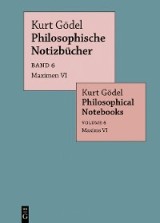Details

Maximen VI / Maxims VI
1. Aufl.
|
CHF 103.20 |
|
| Verlag: | De Gruyter |
| Format: | |
| Veröffentl.: | 04.11.2024 |
| ISBN/EAN: | 9783111391557 |
| Sprache: | deutsch |
| Anzahl Seiten: | 230 |
DRM-geschütztes eBook, Sie benötigen z.B. Adobe Digital Editions und eine Adobe ID zum Lesen.
Beschreibungen
<p>Der Mathematiker Kurt Gödel hat über einen Zeitraum von 22 Jahren (1934-1955) philosophische Bemerkungen, die so genannten Maximen Philosophie (Max Phil), niedergeschrieben. Sie sind in 15 Notizbüchern in der Kurzschrift Gabelsberger überliefert. Das erste Heft enthält allgemeine philosophische Überlegungen, die Hefte zwei und drei bestehen aus Gödels Individualethik. Die dann folgenden zeigen, dass Gödel eine Wissenschaftsphilosophie entworfen hat, in der er seine Erörterungen zu Physik, Psychologie, Biologie, Mathematik, Sprache, Theologie und Geschichte in den Kontext einer Metaphysik stellt.</p>
<p>Erstmals wird nun an der Kurt-Gödel-Forschungsstelle der Berlin-Brandenburgischen Akademie der Wissenschaften eine vollständige, historisch-kritische Edition von Gödels Philosophischen Notizbüchern vorbereitet. Im Rahmen dieser Edition erscheint jährlich ein Band. </p>
<p>Band 6 stellt in einigen Hinsichten eine Fortsetzung von ›Maximen V‹ dar. In systematischer Hinsicht lassen sich insbesondere drei große Themenbereiche ausmachen, nämlich: (I) Geist, Seele, Ich, Bewusstsein, Verstand; (II) Wahrnehmung als Sinneswahrnehmung, aber auch Wahrnehmung durch den Verstand oder mittels Gefühl; sowie (III) Sprache, wobei Gödel sich in diesem Rahmen unter anderem mit dem Wort, dem Satz, der Rede, dem Begriff und dem Urteil befasst. </p>
<p>Erstmals wird nun an der Kurt-Gödel-Forschungsstelle der Berlin-Brandenburgischen Akademie der Wissenschaften eine vollständige, historisch-kritische Edition von Gödels Philosophischen Notizbüchern vorbereitet. Im Rahmen dieser Edition erscheint jährlich ein Band. </p>
<p>Band 6 stellt in einigen Hinsichten eine Fortsetzung von ›Maximen V‹ dar. In systematischer Hinsicht lassen sich insbesondere drei große Themenbereiche ausmachen, nämlich: (I) Geist, Seele, Ich, Bewusstsein, Verstand; (II) Wahrnehmung als Sinneswahrnehmung, aber auch Wahrnehmung durch den Verstand oder mittels Gefühl; sowie (III) Sprache, wobei Gödel sich in diesem Rahmen unter anderem mit dem Wort, dem Satz, der Rede, dem Begriff und dem Urteil befasst. </p>
<p> Over a period of 22 years (1934-1955), the mathematician Kurt Gödel wrote down philosophical remarks, the so-called <em>Maximen Philosophie</em> (<em>Max Phil</em>). They are preserved in 15 notebooks in Gabelsberger shorthand. The first booklet contains general philosophical considerations, booklets two and three consist of Gödel's individual ethics. The following books show that Gödel developed a philosophy of science in which he places his discussions on physics, psychology, biology, mathematics, language, theology and history in the context of a metaphysics. </p>
<p> A complete, historical-critical edition of Gödel's <em>Philosophical</em> <em>Notebooks</em> is now being prepared for the first time at the Kurt Gödel Research Centre of the Berlin-Brandenburg Academy of Sciences and Humanities. One volume will be published each year as part of this edition. </p>
<p> Volume 6 is in some respects a continuation of 'Maximen V'. From a systematic point of view, three major subject areas in particular can be identified, namely: (I) spirit, soul, ego, consciousness, mind; (II) perception as sensory perception, but also perception through the mind or by means of feeling; and (III) language, in which Gödel deals with the word, the sentence, speech, the concept and judgement, among other things. </p>
<p> A complete, historical-critical edition of Gödel's <em>Philosophical</em> <em>Notebooks</em> is now being prepared for the first time at the Kurt Gödel Research Centre of the Berlin-Brandenburg Academy of Sciences and Humanities. One volume will be published each year as part of this edition. </p>
<p> Volume 6 is in some respects a continuation of 'Maximen V'. From a systematic point of view, three major subject areas in particular can be identified, namely: (I) spirit, soul, ego, consciousness, mind; (II) perception as sensory perception, but also perception through the mind or by means of feeling; and (III) language, in which Gödel deals with the word, the sentence, speech, the concept and judgement, among other things. </p>
<strong>Eva-Maria Engelen</strong>, Berlin-Brandenburg Academy of Sciences and Humanities, Berlin, Germany..
Diese Produkte könnten Sie auch interessieren:

Karl Schuhmann, Selected papers on phenomenology

von: Karl Schuhmann, Cees Leijenhorst, Piet Steenbakkers

CHF 177.00















